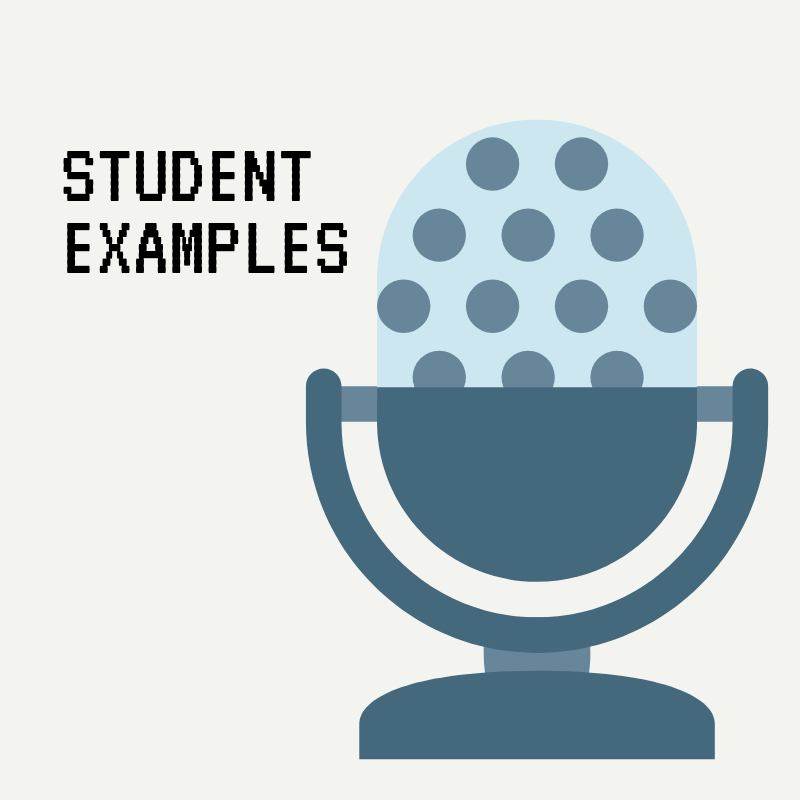
In completing their podcasts, students take on a variety of performative identities. Some of those identities (Gamer, Outsider, Insider, Explorer, Writer, Nerd) are firmly rooted in the students’ experiences, drawing on embodied experiences and memories. These personal performances are reinforced by a variety of embodied elements, including vocal tone, speed, and laughter, as well as multimedia elements, including instrumental soundtracks, movie and tv show clips, video game sound effects, clips of family members, etc.
Other performances are rooted in the genre (Host, Expert). In these genre-driven performances, students focus less on their own embodied experiences and identities, and focus more on the genre conventions and personae associated with the genre. Similarly, students rely on embodied elements, like tone, but unlike the personal performances, the embodied elements derive from example texts, rather than from experiences and memories.
Though I’ve provided an example for each of these performances, they are not necessarily discrete categories. In many instances, a student relies on more than one performance, or cycles between more than one performance.
Personal Performances
Performing Gamer
Unsurprisingly, many students focus on some kind of gaming in their digital literacy podcasts. In doing so, many adopt a gamer persona to share knowledge related to gaming and recall their own experiences gaming. These performances often include explanation of specific games or rules, specific childhood experiences, and gaming-related sound effects.
In this podcast, Cameron explores the ways that video games have changed since Mike Tyson’s Punch Out!! and how his experiences with games lay the foundation for his career goals.
Outsider/Insider
Students also frequently take up the performance of insiders or outsiders of a variety of discourse communities. In many ways, these reflective texts are the most critical and make the best use of literacy studies scholarship. These performances are typically more emotional, and draw heavily on powerful or hurtful memories. To enhance this, they also frequently draw from childhood favorite music, tv shows, and movies, resulting in a nostalgic performance.
In these examples, Rachel explores her experiences as a pop culture outsider due to her exposure to PBS programming, rather than popular Nickelodeon or Disney programming, and Erin explores the ways that TV fandoms helped her to cope with her parents’ divorce and other difficult transitions.
Explorer
Many students approach the digital literacy narrative podcast by performing exploration. They see themselves making a “journey” through literacy and frequently mark progress or development through these exploratory performances. Though still rooted in personal experiences, students who approach the podcast by performing the explorer take on a sense of expertise. They speak on their experiences with poise and certainty, drawing out provocative conclusions about their journeys. Like insider/outsider performances, the explorer performance relies heavily on exploring emotion, memory, and sensations.
In this podcast, Cassandra details her exploration of online discourse communities and how those explorations shaped her literacies.
Writer
Performing a writer is less common in these narratives, and usually emphasizes the connections students observe between writing as an action (i.e. using a pen or keyboard to make words) and writing as a method of communication (i.e. a way to record and share ideas). These performances tend to emphasize tools, such as pens, pencils, keyboards, and typewriters, and the ways bodies interact with those tools. The performance of writer draws on personal, often influential memories, which are sometimes good, and sometimes bad. Though students may not rely on many embodied elements in these performances, the body is ever present in that it is constantly evoked throughout these performances.
In this podcast, A. E. shares the story of her Royal Deluxe Typewriter, her poetry, and her transition to digital word processing.
Nerd
Participating in Fandoms is a common feature of students’ digital literacy narratives. Many students identify their participation in fandom as a profound, but not always positive, experience. In performing nerd, students invite their audiences to experience some fairly cringe-worthy memories, which rely on visceral descriptions of the awkwardness of young nerdom.
In this podcast, Dalia shares an excerpt from her fan fiction Harry Potter and the Sister Surprise how it turned her off digital writing.
Genre-Driven Performances
Host
Students who listen to podcasts on their own are more likely to adapt the performance of host for their podcasts. The host persona “breaks the fourth wall” to address listeners, provides an outline of the segment, assumes a continuous series (e.g. using phrases like “this time” or “next episode”), and takes on the conversational tone of a topic-related podcast. These performances tend to be less personal and rely less on embodied experiences, but rely on embodied modes such as tone to emulate popular podcast hosts.
Here, Ty hosts a podcast on podcast. He deliberately draws on the conventions of the tech podcast genre to establish his performative character, which is knowledgeable and witty.
Expert
Similarly, some students commit to an expert performance, wherein they take up the stance of a expert on their own experiences or the topic at hand. Unlike the personal performances, expert performances approach the narrative a scientific evidence. Students who use this approach typically affect an “NPR voice.” Frequently, these podcasts enlist additional voice talent to act as interviewers.
Mocking All Things Considered, Ethan’s podcast positions him as a public intellectual, interviewed to share his knowledge.
